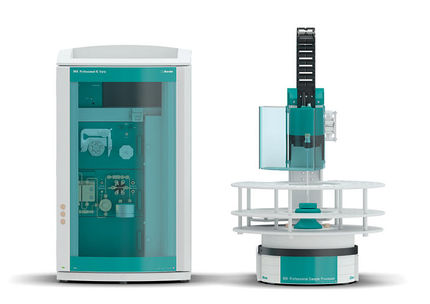To use all functions of this page, please activate cookies in your browser.
my.chemeurope.com
With an accout for my.chemeurope.com you can always see everything at a glance – and you can configure your own website and individual newsletter.
- My watch list
- My saved searches
- My saved topics
- My newsletter
Henry Eyring
Henry Eyring (February 20, 1901 – December 26, 1981) was a Mexican–American theoretical chemist whose primary contribution was in the study of chemical reaction rates and intermediates. A prolific writer, he authored more than 600 scientific articles, ten scientific books, and a few books on the subject of science and religion. He was also a recipient of the National Medal of Science in 1966 for developing the Absolute Rate Theory of chemical reactions. He was also elected president of the American Chemical Society in 1963 and the Association for the Advancement of Science in 1965. Product highlight
HistoryEyring was reared on a cattle ranch in Colonia Juarez, Mexico, for the first 11 years of his life. In July 1912, the Eyrings and about 4,200 other immigrants were driven out of Mexico by violent insurgents during the Mexican Revolution and moved to El Paso, Texas. After living in El Paso for approximately one year, the Eyrings relocated to Pima, Arizona, where Henry completed high school and showed a special aptitude for mathematics and science. He also studied at Gila Academy in Thatcher, Arizona, now Eastern Arizona College, where one of the pillars at the front of the main building still bears his name, along with that of his brother-in-law, Spencer W. Kimball, later president and prophet of The Church of Jesus Christ of Latter-day Saints. By 1919, Eyring had received a state fellowship to the University of Arizona, where he received degrees in mining engineering, metallurgy, and chemistry. He subsequently pursued and received his doctoral degree in Chemistry from the University of California, Berkeley. After a review of his dissertation, Princeton University recruited Eyring as an instructor in 1931. He would continue his work at Princeton until 1949 when he was offered a position as dean of the graduate school at the University of Utah. The chemistry building on the University campus is now named in his honor. He had three sons with his wife, Mildred Bennion. The oldest, Edward M. "Ted" Eyring is a chemistry professor at the University of Utah. Henry B. Eyring, is the Second Counselor in the First Presidency of The Church of Jesus Christ of Latter-day Saints. Harden B. Eyring, is a higher education administrator for the State of Utah. Religious beliefsEyring was a member of The Church of Jesus Christ of Latter-day Saints throughout his life. His views of science and religion were captured in this quote: "Is there any conflict between science and religion? There is no conflict in the mind of God, but often there is conflict in the minds of men" (Reflections of a Scientist, pg. 2). Sterling McMurrin believed he should have received the Nobel Prize but was not awarded it because of his religion ("Matters of Conscience: Conversations With Sterling M. McMurrin on Philosophy, Education, and Religion" by Sterling M. McMurrin & L. Jackson Newell, Signature Books, 1996). As a member of the LDS Church, he served as a branch president, district president, and, for over twenty years, a member of the general board of the Deseret Sunday School Union. Awards
Scientific publications: booksHenry Eyring authored, co-authored, or edited the following books:
Religious publications: books
See also
|
||||
| This article is licensed under the GNU Free Documentation License. It uses material from the Wikipedia article "Henry_Eyring". A list of authors is available in Wikipedia. |







